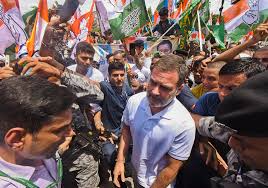Rahul Gandhi leads Oppn march to EC office in Patna over electoral rolls revision in Bihar

Patna, July 9, 2025 — Rahul Gandhi marched through the streets of Patna today, leading a large opposition rally to the Election Commission office. The protest aimed to challenge the recent revision of electoral rolls in Bihar. Leaders from the INDIA bloc joined him in condemning what they described as an unfair and targeted deletion of voters.
The rally brought together Tejashwi Yadav of the RJD, CPI(M)’s Sitaram Yechury, CPI’s D. Raja, and CPI(ML)’s Dipankar Bhattacharya. They claimed that the Election Commission’s Special Intensive Revision (SIR) had unfairly removed the names of thousands of voters, especially those from marginalized communities.
Why Are Opposition Leaders Protesting?
The Election Commission recently launched a Special Intensive Revision of the electoral rolls in Bihar. This process is meant to update voter lists. However, opposition parties say it has disproportionately affected the poor, migrant workers, Dalits, and Mahadalits. They believe many people lost their voting rights without proper notification or cause.
Rahul Gandhi strongly criticized the move.
“We will not let Bihar become another Maharashtra,” he said. “There, democracy suffered silently. Here, we are speaking out.”
He claimed the revision process aims to manipulate the upcoming Bihar elections by erasing legitimate voters from the list.
Bihar Bandh and Statewide Unrest
Today’s march formed a part of the wider Bihar Bandh, a day-long shutdown across the state. Protesters blocked roads and railway tracks in cities like Muzaffarpur, Gaya, Hajipur, and Darbhanga. Shops shut down, and public services stalled as thousands joined in.
Tejashwi Yadav, addressing the crowd, said,
“Why are poor people and those from backward communities the only ones losing their names? This isn’t a mistake—it’s a political strategy.”
He emphasized that the protest was about protecting the right to vote for everyone, especially those with the least power.
Legal Action Underway
Opposition parties and rights groups have filed more than 40 petitions in the Supreme Court. They argue that the voter roll revision violates election laws and affects only specific sections of society. The court will begin hearing the matter on July 10.
Many petitioners say voters were not informed about the revision process. In several districts, families found out about the deletions only after officials visited their homes.
Advocate Ritu Singh, representing one of the petitioners, explained,
“People living in slums or working as laborers often don’t have the time or means to verify their names. The EC should have reached out more actively.”
EC Defends Its Actions
The Election Commission has denied all allegations of bias. It insists that the revision followed standard procedures and aimed to remove duplicate or ineligible entries.
Chief Election Commissioner Rajiv Kumar said,
“A clean and updated voter list is the foundation of fair elections. Voters can apply for corrections or re-inclusion if needed.”
He also said that the EC had conducted outreach campaigns. However, opposition leaders say these efforts did not reach many people in rural and poor areas.
Stakes Are High for Upcoming Bihar Elections
Bihar will hold assembly elections in October–November 2025. With over 7 crore voters, it remains a crucial battleground for both the ruling NDA and the opposition INDIA alliance.
Many believe the electoral roll revision could influence the outcome of the election. Voter suppression, especially among the poor, could shift the balance in key constituencies.
Dipankar Bhattacharya of the CPI(ML) said,
“Today it’s Bihar, tomorrow it could be UP or West Bengal. We are fighting for the soul of democracy.”
People’s Voices Add to the Tension
Many protestors at the march said they had personally lost their voting rights. Rekha Devi, a domestic worker in Patna, held up her voter ID and said,
“I have voted in every election since 2009. Suddenly, my name is gone. How can they do this?”
Her words echoed the anger and anxiety felt by many in the crowd. Protesters demanded that the EC restore all valid voter names immediately.
Sunil Kumar, a daily wage earner from Muzaffarpur, said,
“No one told us anything. Now they say we can’t vote. We are not invisible.”
The Bigger Picture
Opposition leaders say this issue goes beyond Bihar. They view it as part of a wider strategy to silence dissenting voices through legal and administrative tools. They accuse the ruling BJP of using institutions to maintain control over election outcomes.
Rahul Gandhi made that point clear:
“This is not about one state. This is about the future of Indian democracy. If the vote of the poorest citizen doesn’t count, the system has failed.”
The opposition has pledged to continue its campaign until the revision process is reviewed or halted. With the Supreme Court set to hear the case tomorrow, many are watching closely for possible intervention.
Conclusion
Today’s march in Patna marked a powerful show of resistance. It united political parties, rights activists, and everyday citizens in a demand for electoral justice. Whether the Election Commission takes corrective steps or the Supreme Court intervenes, the message from Bihar is loud and clear—every vote matters, and no citizen should be left out.
The battle over electoral rolls may shape not only Bihar’s elections but also the future of voter rights in India.






